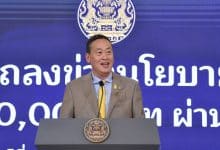Cash in the cloud: Thailand gears up for digital wallet launch

Thailand’s deputy finance minister recently disclosed that the prime minister will announce details about the digital wallet project, including registration and identity verification steps, on Wednesday, July 24. The project aims to distribute 10,000 baht through digital wallets, pending approval from various authorities.
Deputy Finance Minister Paopum Rojanasakul addressed concerns raised by Deputy Leader of the Move Forward Party, Sirikanya Tansakul, regarding the Bank for Agriculture and Agricultural Cooperatives (BAAC) Board’s delay in approving the 170 billion baht budget for the project.
She speculated that the government had not yet submitted the project for legal review due to potential misuse of BAAC funds. Rojanasakul clarified that the project must be submitted as a complete package for legal interpretation, ensuring all conditions and limitations are thoroughly addressed.
The project timeline remains on track, Rojanasakul confirmed. The subcommittee will meet on July 10 to finalise conditions, followed by a policy committee meeting chaired by Prime Minister Srettha Thavisin on July 15. The Prime Minister will then announce the project details on July 24 before it goes to the Cabinet meeting on July 30. Consultations with the legal committee will occur after this date.
Rojanasakul assured that alternative plans are in place if the legal committee finds the project contradicts BAAC’s objectives.
“We have Plan B and Plan C, but we will proceed with Plan A first.”
Registration and identity verification for the project will occur in the third quarter, and funds will reach the public by the fourth quarter. Rojanasakul refrained from specifying an exact date to maintain flexibility. He urged the public to separate concerns about the budget process from the actual implementation, assuring that all budgetary issues are being handled as per the law.
Electronics
Concerning prohibited items, Rojanasakul mentioned that mobile phones and other electronics are likely to be excluded to prevent funds from leaving the country. The Ministry of Commerce is currently reviewing which items should be restricted, with conclusions expected in the July 10 subcommittee meeting.
In response to Tansakul’s concerns about the project’s impact on public trust, Rojanasakul emphasised that all opinions are considered.
“We reflect on whether our actions align with legal principles. If they do, we proceed and address differing viewpoints.”
He also confirmed that families could pool their 10,000 baht allocations to make larger purchases, such as a cart for selling goods, aligning with the project’s goals.
The World Bank’s assessment that the digital wallet project could boost GDP by 0.5-1% was also addressed. Rojanasakul highlighted the project’s novelty and its potential to circulate money within local communities. He noted that various factors, such as the list of prohibited items, could affect the economic impact, making it difficult to provide a definitive estimate.
When asked about the World Bank’s observation that the Bank of Thailand (BoT) might lower policy interest rates by 0.25-0.5% annually if the project is not implemented, Rojanasakul cautioned against linking fiscal and monetary measures too closely. He cited a previous instance when the BoT preemptively raised interest rates in anticipation of the digital wallet’s rollout, which did not materialise, leading to inflation issues.
The government, Rojanasakul assured, is committed to listening to concerns and evaluating assessments to make informed decisions. The digital wallet project, though complex and unprecedented, aims to stimulate local economies and ensure financial support reaches the public efficiently, reported Khaosod.
Latest Thailand News
Follow The Thaiger on Google News:


























